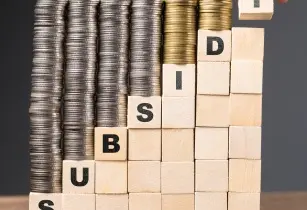S&P Global Ratings revised Nigerias credit outlook to stable from negative and affirmed the countrys B-credit rating
The rating agency's decision is based on ongoing reforms by President Bola Tinubu, including the scrapping of fuel subsidies, replacing the embattled governor of the Central Bank of Nigeria (CBN), and implementing vital FX reforms. Nevertheless, S&P is highly concerned about rising inflation and high fiscal spending, while the coup in Niger and increasing insecurity in West Africa serve as additional short-term risks.
Tinubu hit the ground running after being inaugurated on 29 May. According to S&P, the 'newly elected government has moved quickly to implement a series of fiscal and monetary reforms, which we believe will gradually benefit public finances and the balance of payments'. Tinubu's reforms aim to attract investment, improve domestic industries, and unlock the country's economic potential. On the fiscal policy front, Nigeria's expensive fuel subsidy scheme, which accounted for roughly 15% of fiscal expenditures in 2022, was scrapped in June 2023. This relieved significant pressure off the fiscus, which is expected to generate fiscal savings to the value of 2.5% of GDP in 2023, according to S&P.
Crucial FX reforms, including the unification and devaluation of the naira, are also welcomed by the rating agency and factored into its decision. Moreover, the central bank is being revitalised. CBN Governor Godwin Emefiele was replaced with the experienced Acting Governor Folashodun Shonubi. At the same time, Tinubu appointed Jim Obazee as a special investigator tasked with probing corruption and maladministration at the apex bank. Several government agencies are being overhauled, with Tinubu reforming and dissolving the boards of several government parastatals and state-owned companies, with most being revamped, combined or scrapped. S&P believes these reforms will benefit Nigeria's fiscal and economic outlook, while the World Bank expects these reforms to save Nigeria up to US$5.2bn in 2023.
While S&P is more optimistic than at the start of the year, the picture is far from rosy. While scrapping fuel subsidies was pivotal to alleviate spending pressures and unlock funds for Tinubu's reforms, S&P believes that current planned spending is still too large and increases fiscal risks. Furthermore, inflation is also highly concerning and threatens ongoing reforms – removing fuel subsidies directly contributes to higher prices in Nigeria. The hydrocarbons sector continues to struggle, with weak oil production stifling oil exports and profits and increasing balance of payment pressures. Lastly, the rating agency also listed geopolitical tensions relating to the coup in Niger as potential sources of risk.
Nigeria's debt servicing capacity is of particular concern and deteriorated due to persistent debt-driven deficit spending. Debt servicing costs have risen markedly over the past few years, and with the naira losing nearly 40% of its value since May, external debt repayment costs have ballooned. Before leaving office, former President Muhammadu Buhari signed a bill which restructured short-term loans owed to the central bank to long-term bonds in May. The conversion aimed to lower debt interest costs, as the oil producer spent the bulk of its revenues on debt service payments last year. The Debt Management Office (DMO) cautioned that the combination of the repackaged debt and new borrowings related to the 2023 budget might lift the overall debt burden to the equivalent of US$172bn. This debt burden is a crucial hindrance to the new government and the ongoing policy reform process.








